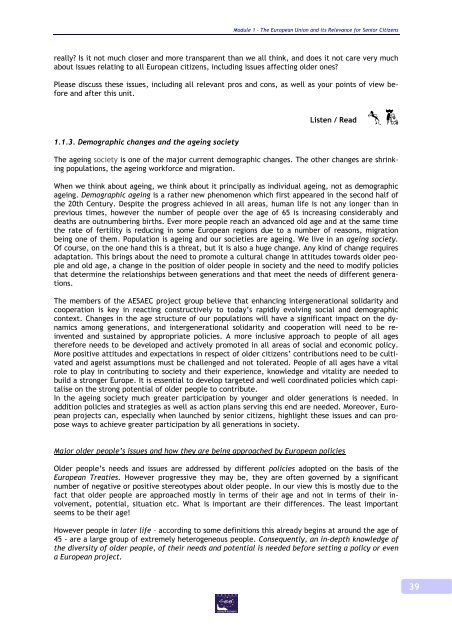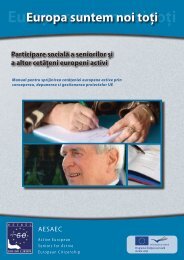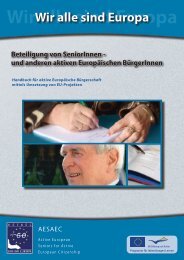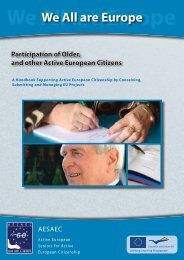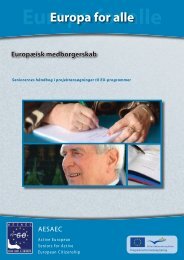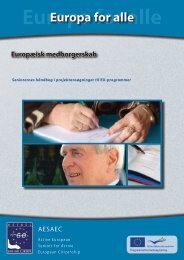We All are Europe - AESAEC
We All are Europe - AESAEC
We All are Europe - AESAEC
Create successful ePaper yourself
Turn your PDF publications into a flip-book with our unique Google optimized e-Paper software.
Module 1 – The <strong>Europe</strong>an Union and its Relevance for Senior Citizens<br />
really Is it not much closer and more transp<strong>are</strong>nt than we all think, and does it not c<strong>are</strong> very much<br />
about issues relating to all <strong>Europe</strong>an citizens, including issues affecting older ones<br />
Please discuss these issues, including all relevant pros and cons, as well as your points of view before<br />
and after this unit.<br />
Listen / Read<br />
1.1.3. Demographic changes and the ageing society<br />
The ageing society is one of the major current demographic changes. The other changes <strong>are</strong> shrinking<br />
populations, the ageing workforce and migration.<br />
When we think about ageing, we think about it principally as individual ageing, not as demographic<br />
ageing. Demographic ageing is a rather new phenomenon which first appe<strong>are</strong>d in the second half of<br />
the 20th Century. Despite the progress achieved in all <strong>are</strong>as, human life is not any longer than in<br />
previous times, however the number of people over the age of 65 is increasing considerably and<br />
deaths <strong>are</strong> outnumbering births. Ever more people reach an advanced old age and at the same time<br />
the rate of fertility is reducing in some <strong>Europe</strong>an regions due to a number of reasons, migration<br />
being one of them. Population is ageing and our societies <strong>are</strong> ageing. <strong>We</strong> live in an ageing society.<br />
Of course, on the one hand this is a threat, but it is also a huge change. Any kind of change requires<br />
adaptation. This brings about the need to promote a cultural change in attitudes towards older people<br />
and old age, a change in the position of older people in society and the need to modify policies<br />
that determine the relationships between generations and that meet the needs of different generations.<br />
The members of the <strong>AESAEC</strong> project group believe that enhancing intergenerational solidarity and<br />
cooperation is key in reacting constructively to today’s rapidly evolving social and demographic<br />
context. Changes in the age structure of our populations will have a significant impact on the dynamics<br />
among generations, and intergenerational solidarity and cooperation will need to be reinvented<br />
and sustained by appropriate policies. A more inclusive approach to people of all ages<br />
therefore needs to be developed and actively promoted in all <strong>are</strong>as of social and economic policy.<br />
More positive attitudes and expectations in respect of older citizens’ contributions need to be cultivated<br />
and ageist assumptions must be challenged and not tolerated. People of all ages have a vital<br />
role to play in contributing to society and their experience, knowledge and vitality <strong>are</strong> needed to<br />
build a stronger <strong>Europe</strong>. It is essential to develop targeted and well coordinated policies which capitalise<br />
on the strong potential of older people to contribute.<br />
In the ageing society much greater participation by younger and older generations is needed. In<br />
addition policies and strategies as well as action plans serving this end <strong>are</strong> needed. Moreover, <strong>Europe</strong>an<br />
projects can, especially when launched by senior citizens, highlight these issues and can propose<br />
ways to achieve greater participation by all generations in society.<br />
Major older people’s issues and how they <strong>are</strong> being approached by <strong>Europe</strong>an policies<br />
Older people’s needs and issues <strong>are</strong> addressed by different policies adopted on the basis of the<br />
<strong>Europe</strong>an Treaties. However progressive they may be, they <strong>are</strong> often governed by a significant<br />
number of negative or positive stereotypes about older people. In our view this is mostly due to the<br />
fact that older people <strong>are</strong> approached mostly in terms of their age and not in terms of their involvement,<br />
potential, situation etc. What is important <strong>are</strong> their differences. The least important<br />
seems to be their age!<br />
However people in later life – according to some definitions this already begins at around the age of<br />
45 - <strong>are</strong> a large group of extremely heterogeneous people. Consequently, an in-depth knowledge of<br />
the diversity of older people, of their needs and potential is needed before setting a policy or even<br />
a <strong>Europe</strong>an project.<br />
39


